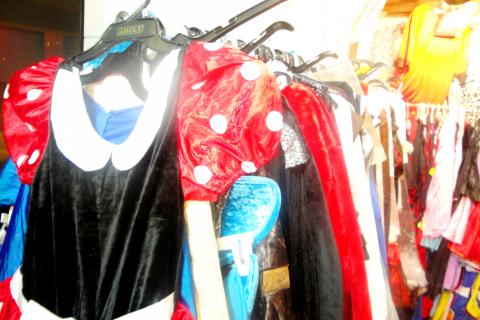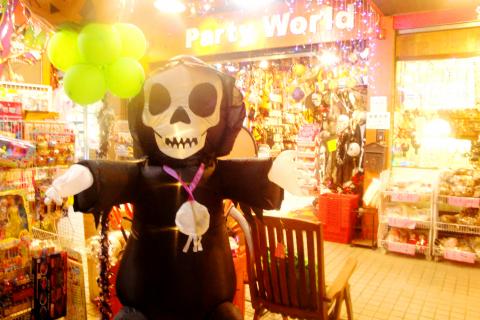Halloween is right around the corner and you still don’t know what to dress up as. You’ve been to the costume stores in Ximending (西門町) on Hanzhong Street (漢中街) and the good ones are already spoken for. It’s time to get creative on the aptly nicknamed Halloween Street, a block northwest of Taipei Main Station. This two-block area on Changan Rd (長安路) between Chongqing North Road (重慶北路) and Chengdu Road (成都路) boasts 14 stores that sell a variety of Halloween supplies ranging from disco wigs to swords filled with fake blood to superhero costumes for toddlers.
The Holiday House (節慶屋) at 95 Changan W Rd (台北市大同區長安西路95號), tel: (02) 2559-4897 is geared more towards women with the requisite flirtatious Little Red Riding Hood and risque female versions of Captain America costumes. Prices are between NT$499 and NT$599 for adult costumes and NT$100 less for children. Unfortunately, the Holiday House seemed like a Christmas store moonlighting as a Halloween shop.
A few steps down the road is Lucky House (吉祥屋) at 109 Changan W Rd (台北市大同區長安西路109號), tel: (02) 2550-0262. At first, the list prices on everything seemed to be a bit higher than the Holiday House, but soon the owner came over and started offering better deals. She turned out to be a spirited bargainer and a costume that contained a hat, wig and sailor’s dress went from being NT$970 to NT$750 with a few clicks on the buttons of her oversized calculator. Eventually, a price of NT$700 was settled on, but not before using the time-honored pretending-to-walk-away tactic of negotiation.

Photo: Marcus Aurelius
Technically not on Changan West Road but worth mentioning because it’s very visible from the intersection at Changan and Taiyuan is Party World Thematic Warehouse (派對世界) at 63 Taiyuan Rd (台北市太原路63號), tel: (02) 2559-9758. This two-level shop had the widest selection of all with kids’ costumes, fairy wings and tons of pirate paraphernalia. One of their specialties is all shapes and sizes of mylar balloons, which ranged in prices from NT$100 to NT$450 filled with helium. Overall, Party World would be the first place to shop to decorate for a Halloween party.
A few other tips for this area would be to do a walk through of all of the stores before making any purchases. Never pay the actual price on the tag for anything if it’s over a few hundred dollars. Add items together and ask for a group discount. If you want to dicker with the salespeople, they are more willing to cut down the prices, but do it out of earshot of other customers. Also, try to go at a time that is less busy. Every night from now until October 31 will be crowded with people looking for last-minute costume ideas. A stroll through in the early afternoon is recommended.
The Taipei Times will have complete Halloween coverage — from bars and clubs to dance halls — in next Friday’s Features section.

Photo: Marcus Aurelius

Towering high above Taiwan’s capital city at 508 meters, Taipei 101 dominates the skyline. The earthquake-proof skyscraper of steel and glass has captured the imagination of professional rock climber Alex Honnold for more than a decade. Tomorrow morning, he will climb it in his signature free solo style — without ropes or protective equipment. And Netflix will broadcast it — live. The event’s announcement has drawn both excitement and trepidation, as well as some concerns over the ethical implications of attempting such a high-risk endeavor on live broadcast. Many have questioned Honnold’s desire to continues his free-solo climbs now that he’s a

As Taiwan’s second most populous city, Taichung looms large in the electoral map. Taiwanese political commentators describe it — along with neighboring Changhua County — as Taiwan’s “swing states” (搖擺州), which is a curious direct borrowing from American election terminology. In the early post-Martial Law era, Taichung was referred to as a “desert of democracy” because while the Democratic Progressive Party (DPP) was winning elections in the north and south, Taichung remained staunchly loyal to the Chinese Nationalist Party (KMT). That changed over time, but in both Changhua and Taichung, the DPP still suffers from a “one-term curse,” with the

Jan. 26 to Feb. 1 Nearly 90 years after it was last recorded, the Basay language was taught in a classroom for the first time in September last year. Over the following three months, students learned its sounds along with the customs and folktales of the Ketagalan people, who once spoke it across northern Taiwan. Although each Ketagalan settlement had its own language, Basay functioned as a common trade language. By the late 19th century, it had largely fallen out of daily use as speakers shifted to Hoklo (commonly known as Taiwanese), surviving only in fragments remembered by the elderly. In

Lines between cop and criminal get murky in Joe Carnahan’s The Rip, a crime thriller set across one foggy Miami night, starring Matt Damon and Ben Affleck. Damon and Affleck, of course, are so closely associated with Boston — most recently they produced the 2024 heist movie The Instigators there — that a detour to South Florida puts them, a little awkwardly, in an entirely different movie landscape. This is Miami Vice territory or Elmore Leonard Land, not Southie or The Town. In The Rip, they play Miami narcotics officers who come upon a cartel stash house that Lt. Dane Dumars (Damon)